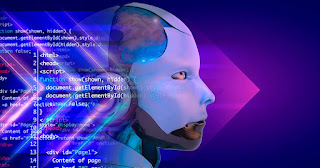The Growing Significance of AI in Software Development
The Growing Significance of AI in Software Development
Software development is being transformed by artificial intelligence. With its ability to enhance every aspect of the process from coding to deployment, AI is introducing a new paradigm for technology innovation.
AI and ML Technologies accelerate the software development Lifecycle, which helps engineers optimize software workflow at every stage of the process.
AI is expected to bring revolutionary changes in the software development industry by redefining the way engineers work and handle code, leading to advancements in productivity, quality, and speed. The disruptive potential of AI is expected to usher in a new era of innovation in the industry.
Artificial intelligence (AI) pertains to computer programs that can perform tasks requiring human intelligence and judgment, such as reasoning and generalization. To do this, the computer must have the ability to perceive its surroundings and act based on its discoveries.
Using AI algorithms for software development can automate quality assurance, enhance project planning, and improve user experience. A recent study shows that incorporating AI in software development has led to a ten-fold increase in developer efficiency.
Below are some instances of how AI can aid in the software development and deployment process of your business by automating several cognitive and manual tasks.
Growth in Developmental Scale and Speed
The incorporation of AI across all aspects of DevOps is expected to impact the evolution of software delivery performance significantly. Key time-based performance metrics include deployment frequency, change lead times, and service restoration times.
Machine learning or deep learning can speed up various processes, particularly software testing. Rather than relying on quality assurance analysts to run tests manually, AI can automate the process. This not only saves time but also ensures that a greater number of possibilities are tested. Given the high probability of error in manual quality assurance, AI is indispensable to the process. By enabling quick and precise testing, computers reduce the failure rate and accelerate the development cycle.
Software developers must utilize artificial intelligence (AI) to optimize processes and minimize inefficiencies. By implementing a hyper-automation platform bolstered by machine learning, tasks that are labor-intensive and traditionally done manually can be delegated to machines capable of completing them more rapidly and accurately. This approach not only saves time but also enhances overall efficiency. .Furthermore, by leveraging AI, developers can improve their coding accuracy and expedite the overall coding process.
The Evolution of Developers' Roles
Because of AI, the role of software developers is changing. Although it can assist them with their code, it will be years before it can write code autonomously or take their place. However, when developers automate tasks and delegate them to an AI system, they can focus their talents on different tasks and hone their collaboration abilities with AI.
Because AI handles routine tasks, programmers can focus on more difficult issues. Their roles will change in this manner. Instead of replacing the software development process, this will improve and strengthen it. Indeed, as AI becomes more prevalent, there will be a demand for new types of software developers—those who can collaborate with AI and code it.
AI may eventually be able to develop programs, but it will not replace human programmers. In order to produce better code, software experts need to work alongside AI. One strategy for collaboration involves assigning AI the more monotonous portions of coding while addressing the more complex tasks themselves.
There is a lot of worry that if AI learns to write code, software developers will become obsolete, yet software development is complicated and needs a human brain to guide it.
Strategic Decision-Making
Strategic decision-making AI can have a significant influence by automating it and minimizing the need for human participation. AI can revolutionize decision-making by minimizing debates over which features and products to prioritize. With prior training on the successes and failures of previous software, AI can evaluate the performance of new software and mitigate risks, thus saving time and resources that would have been spent on prolonged discussions
The software development process will revolutionize decision-making as all decisions will be based on analytics. With the rapid growth of computing power and data storage each year, computers can supplement human intelligence by assisting humans in making wiser judgments. This can lead to a transformation in the decision-making process, as all decisions will be based on analytics.
One can mitigate risks and associated costs with improved decision-making based on analytics and past behavior. AI-enabled decision-making can help eliminate human biases and errors. Data can assist in making informed and logical decisions. Machine learning can gather, process, and analyze data before making decisions based on this information.
Error Management
Your programming assistant powered by artificial intelligence (AI) can utilize historical data and software analytics to learn from experience and identify common mistakes.. Rolling back would be less necessary if these were identified during the development process. Operations teams can apply machine learning to analyze system logs in the post-deployment phase to highlight faults and find anomalies proactively.
Most downtime in software development is caused by error management, particularly if you use a software-as-a-service (SaaS) or cloud-based platform-as-a-service. Every minute of downtime costs you money and hurts your reputation because clients need your services 24/7.
A developer must manually fix a software issue once it is discovered. It takes a long time to do this. One of the benefits of artificial intelligence in software development is the automatic detection and diagnosis of software faults, eliminating the need for human intervention.. This method is effective and economical.
Accurate Calculations
As software developers are infamous for failing to estimate costs and time-lines, AI can help you train data from all previous projects to give accurate calculations on required efforts, time, and budget. A reasonable prediction needs proper understanding and context expertise; for these, you can train AI.
It is tough to expect the obstacles you'll face on the way and how much they will delay deadlines without AI. This information can assist in deciding which can be accepted and which not. Giving clients accurate information about software delivery improves customer retention and is good for business.
Establish a connection to receive feedback in real-time
Real-time user input is typically built into video conferencing software to enhance the user experience. Real-time feedback from AI-enabled software development tools can lead to changes in how consumers use and engage with your product.
Algorithms for machine learning can be trained to observe how people interact with a particular platform. A dynamic software experience can be built using AI, which can also offer changing material and give the developer statistics on which on-page elements could be used better.
Suppose problems are rectified on the fly through a continuous feedback loop. In that case, continuous feedback can ensure that the consumer suffers the least downtime and that software is more accessible.
Bottom Line
Business apps from your modern software company will soon considerably benefit from AI and ML Technologies. Integrating it into as many parts of the software development process as possible will help it improve. Soon, software engineers will have to use AI. It is not about giving up the spotlight since it has already seized it in a way that has never been done before. Whether it takes the shape of a chatbot, an AI-powered office phone system, or a decision-making AI, we won't function without it.
The environment for software development is changing too quickly for us to stay up with it. To keep up with the competition, you must be aware of new technology and quickly adopt it.
AI provides advantages outside of software development, as was already mentioned. The most advantageous feature of AI is its capacity to reduce time in any given process because time management is a key concern for any DevOps firm. AI was developed to support human endeavors and reduce the need for manual work. Software development is only one of several sectors where it's already influencing and creating waves that will eventually be significant. As coders, testers, and project managers, organizations are expected to produce software of higher quality at a lower cost.
Check out our latest blog: how AI is being used to improve software development processes, enhance software quality, and increase productivity.



Comments
Post a Comment